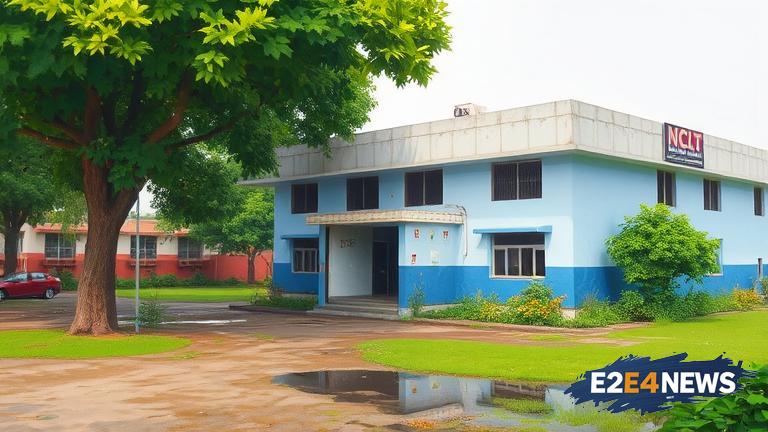The Punjab and Haryana High Court has been informed that the NCLT Chandigarh has been relocated to a makeshift building in the city due to water seepage issues in its original premises. The tribunal was shut down temporarily after water seepage was detected in the building, prompting the authorities to take immediate action. The NCLT Chandigarh is a crucial institution that deals with company law-related cases, and its functioning is essential for the smooth operation of businesses in the region. The water seepage issue has caused significant disruption to the tribunal’s proceedings, and the relocation to a makeshift building is expected to provide a temporary solution. The NCLT Chandigarh has been functioning from the makeshift building since the issue was detected, and the authorities are working to resolve the problem as soon as possible. The tribunal’s relocation has not affected its functioning, and all cases are being heard as scheduled. The NCLT Chandigarh is one of the several tribunals in the country that deal with company law-related cases, and its efficient functioning is crucial for the Indian economy. The tribunal’s jurisdiction extends to the states of Punjab, Haryana, and the Union Territory of Chandigarh, and it has been instrumental in resolving several high-profile company law cases in the region. The water seepage issue in the NCLT Chandigarh’s original premises has raised concerns about the maintenance of government buildings in the city. The authorities have been criticized for their lack of attention to the maintenance of public buildings, which has led to such issues. The NCLT Chandigarh’s relocation to a makeshift building is a temporary solution, and the authorities must take immediate action to resolve the issue permanently. The tribunal’s functioning is essential for the smooth operation of businesses in the region, and any disruption to its proceedings can have significant consequences. The NCLT Chandigarh has been working to resolve the issue as soon as possible, and the authorities are expected to take necessary steps to prevent such issues in the future. The water seepage issue has also raised concerns about the safety of the building and the well-being of the people working there. The authorities must take immediate action to ensure that the building is safe and secure for occupation. The NCLT Chandigarh’s relocation to a makeshift building is a significant development, and it highlights the need for better maintenance of government buildings in the city. The tribunal’s functioning is crucial for the Indian economy, and any disruption to its proceedings can have significant consequences. The authorities must take necessary steps to prevent such issues in the future and ensure that the tribunal can function smoothly. The NCLT Chandigarh is expected to return to its original premises once the water seepage issue is resolved, and the authorities are working to complete the repairs as soon as possible. The tribunal’s relocation to a makeshift building is a temporary solution, and it is expected to provide a smooth transition until the original premises are ready for occupation. The NCLT Chandigarh’s functioning is essential for the smooth operation of businesses in the region, and the authorities must take necessary steps to ensure that the tribunal can function efficiently. The water seepage issue has caused significant disruption to the tribunal’s proceedings, and the authorities are working to resolve the issue as soon as possible. The NCLT Chandigarh is one of the several tribunals in the country that deal with company law-related cases, and its efficient functioning is crucial for the Indian economy. The tribunal’s jurisdiction extends to the states of Punjab, Haryana, and the Union Territory of Chandigarh, and it has been instrumental in resolving several high-profile company law cases in the region. The NCLT Chandigarh’s relocation to a makeshift building is a significant development, and it highlights the need for better maintenance of government buildings in the city.
